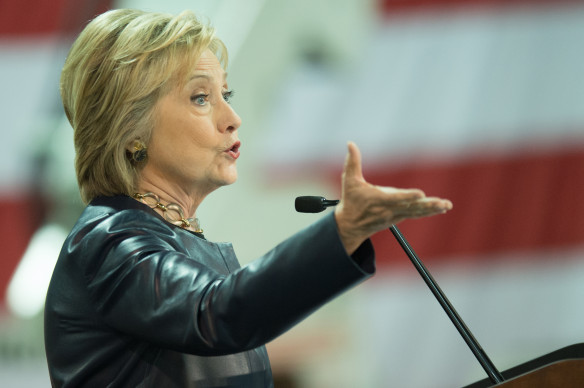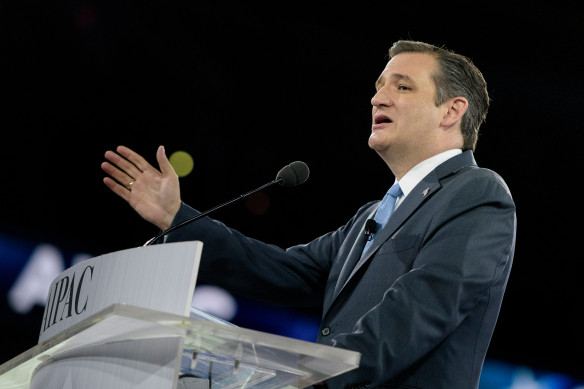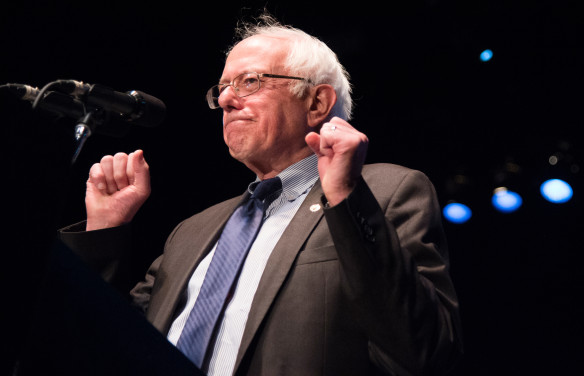The Trump Card
By Mahir Ali | International News | Published 8 years ago
In recent decades, the United States’ gifts to the world include such luminaries as Richard Nixon, Ronald Reagan and George W. Bush. Its heads of state, especially those thrown up by the Republican side of politics, tend to inspire more shock than awe. Even so, Donald Trump would be something of a leap into the dark. And that’s putting it mildly.
There have been assurances from all manner of pundits that the over-the-top property tycoon will not, repeat NOT, make it into the White House. The Republican establishment will baulk at handing him the nomination, especially if he fails to gain a clear majority of delegates during the primaries and caucuses. The prospect has been raised of a contested convention, implying orchestrated manoeuvres in the dark, or at least behind the scenes.
And if that does not work, there is the expectation that he will be soundly trounced in the presidential election itself by Hillary Clinton, the likely Democratic nominee. At least that is what the opinion polls suggest. In fact, the indications are that he would lose by an even bigger margin to Clinton’s rival for the candidacy, Bernie Sanders.
However, there are few certainties in what is shaping up as an incredibly volatile year in American politics. Who knows how Clinton would fare in bare-knuckled debating contests with the no-holds-barred Trump. Besides, while Clinton may be a formidable politician in the traditional mould, she is not hugely popular among voters: young Democrats in particular have overwhelmingly been opting for the elderly Sanders during the selection process.
The candidacy of Sanders, the self-described “democratic socialist” senator from Vermont, was until last year considered as long a shot as that of Trump. He has been involved in politics since the 1960s, and managed to build a constituency for himself largely by keeping his promises and abiding by his declared principles. He was a popular mayor of Vermont through much of the 1980s before running for Congress, serving in the House of Representatives for 16 years before graduating to the Senate in 2007.
Sanders was always something of an aberration on Capitol Hill, an independent who caucused with the Democrats but openly described himself as a socialist in a country where that label tends to be demonised as un-American. He may well have been responsible in large part, though, for the fact that last year more American users of the Merriam-Webster dictionary website looked up the term “socialism” than any other word. At least some of them, it seems, did not find the definition too intimidating.
Naturally, the Democratic Party establishment has tended to view the prospect of a Sanders nomination with as much trepidation as its Republican counterparts have lavished on the idea of a Trump triumph, and there is a tendency among broad sections of the mainstream media to describe this pair of candidates as two sides of the same coin.
 That is not a completely absurd proposition, to the extent that both of them have benefited from widespread disenchantment with politics-as-usual. And, perhaps even more pertinently, economics-as-usual. What is more, there is some crossover in their mutual resistance to the North American Free Trade Agreement (NAFTA) and the Transatlantic Trade and Investment Partnership (TTIP), although their responses are very different. Both also question the value of America’s foreign military interventions, notably in Iraq, albeit not exactly for the same reasons. Furthermore, their responses are widely at variance.
That is not a completely absurd proposition, to the extent that both of them have benefited from widespread disenchantment with politics-as-usual. And, perhaps even more pertinently, economics-as-usual. What is more, there is some crossover in their mutual resistance to the North American Free Trade Agreement (NAFTA) and the Transatlantic Trade and Investment Partnership (TTIP), although their responses are very different. Both also question the value of America’s foreign military interventions, notably in Iraq, albeit not exactly for the same reasons. Furthermore, their responses are widely at variance.
At the domestic level, Sanders and Trump are both symptoms of a malaise that has steadily been exacerbated since the Reagan years. Alongside Margaret Thatcher, Reagan was credited with winning the Cold War, a process that culminated in the demise of the Soviet Union 25 years ago. A corollary of that demise was the reinstitution, in stages, of unfettered capitalism, based on the assumption that the most obvious alternative had been relegated to the dustbin.
It wasn’t only the Soviet example, though, that had prompted Franklin D. Roosevelt to set up the New Deal, offering some relief to the victims of the Great Depression. Nor was the British welfare state founded by the government of Clement Attlee based on precepts propounded by Moscow. In both cases, though, albeit to varying extents, there was a bipartisan consensus behind the mixed economies, which at some level were deemed a means of staving off infatuation with the socialist model.
The need for that evaporated as the extent of Soviet dysfunction became progressively clearer through the 1980s. This led to the stupid assumption that no-holds-barred neoliberalism was the way to go. The safety net receded. Financial markets were deregulated. In some quarters, there was the unsubstantiated belief that the riches consequently accumulated by the captains of industry would by some miracle trickle down to the less fortunate segments of society.
The successors of Thatcherite policies and Reaganism, notably Tony Blair in Britain and Bill Clinton in the US, chose to pursue them to their logical conclusion, paving the way for the crash of 2008. Unfettered capitalism inevitably entails a widening gap between the obnoxiously rich and the unacceptably poor, with the salaried middle classes generally doomed to successively lower rungs of the economic ladder.
The fruits of neoliberal economics were harvested eight years ago. They spawned the ‘Occupy’ movements militating against the growing gap between the one percent and the 99 per cent, but to little avail. The constituencies Sanders and Trump have been building up are part of the consequences.
The differences between them lie inevitably in their reactions to this economic disarray. Whereas Sanders propounds universal healthcare and free higher education for all, Trump focuses on means of reducing the workforce, partly by expelling unverified foreign labourers (even though he has relied on them as a construction magnate) and building a wall across the border with Mexico. He has consistently insisted that this wall will be paid for by Mexico. The Mexican president, and a couple of his predecessors, have called him a Nazi.
That opinion is not restricted to Mexico. Trumps’s fairly clear-cut racism and xenophobia have led to debates in several countries about whether he should be allowed in. Not much to worry about there, though. Similar discussions were conducted about Narendra Modi, and most of them were forgotten once his party won the Indian election.
Trump is, of course, a somewhat bigger problem, even though they more or less have a shared view of Muslims. Trump wants them excluded from the US until the intelligence agencies figure out “what is going on.” His closest runner-up in the Republican primaries and caucuses, Ted Cruz, could possibly portend even worse. Following last month’s terrorist attacks in Brussels, Trump effectively blamed the atrocity on Belgium’s leniency towards Muslims, while Cruz, not wishing to be left behind, suggested that predominantly Muslim areas in US cities should be cordoned off by security forces.
Cruz has won the backing of Jeb Bush, who a year ago was considered something of a shoo-in for the Republican candidacy, but retired after failing to whip up enthusiasm in any given state. Other dropouts such as Ben Carson and Chris Christie have endorsed Trump. Carson was once considered to have a reasonable chance of wresting the candidacy, but he went out of his way to prove that a respectable career in neurosurgery cannot automatically be considered a mark of intelligence, and bowed out of the race after failing to make a mark.
John Kasich, the one relatively moderate Republican who was still in the race at the time of writing, was expected to bow out sooner or later, given his failure to win any primaries or caucuses other than in his home state of Ohio.
Kasich is anyhow hardly much more progressive than trump or Cruz. And the Republican party’s predicament in the forthcoming election is anyhow a consequence of the sharply adversarial politics it has opted for in the wake of Obama’s elevation to the leadership, manifested in both the Tea Party phenomenon and the Republicans’ knee-jerk opposition to Obama’s initiatives, from his rather weak efforts to ameliorate inadequacies in health insurance to his successful overtures to Iran and Cuba, not to mention his right to nominate a Supreme Court justice following the timely demise of Antonin Scalia.
It was Marco Rubio, the baby-faced Republican candidate, who was most vehemently opposed to Obama’s Cuban diplomacy, but clearly not enough of his fellow Cuban-Americans in his home state of Florida were sufficiently enthused by his obduracy on this score, given that Trump romped in by a huge margin in that state, compelling Rubio to bow out of a race in which he rarely looked like a winner.
The likely winner of the Republican nomination — who has won the endorsements of any number of neo-Nazis in the US as well as in Europe, the latter chiefly on account of his implacable opposition to immigrants, particularly of the Muslim variety — is likely to be hoping that he will face Hillary Clinton in the final clash, because he won’t find it hard to shred her in the debates to come. Clinton’s experience in positions of power — as first lady, senator and secretary of state — may well return to haunt her in the final stages of the race.
And even though it is hard to imagine how Trump, as a presumptive component of the one percent, could pretend to empathise with the 99 per cent, he has this far pulled off the charade with aplomb, basing his appeal on the fact that as an independently wealthy entrepreneur he is not beholden to vested interests.
Given his predilections, though, that does not count for much. There is more credibility in Sanders’ appeal to the same disenchanted constituency. Unlike Clinton, he is clearly not sponsored by Wall Street, which is widely seen by many voters as the fount of their misery. Sanders also has no illusions about how tricky it could prove to translate his principles into policy. But at least he can be trusted to stand by his principles, whereas Clinton, compelled to reinvent herself as a progressive in order to block Sanders’ path to the nomination — and quite possibly the presidency — comes across as a liar.
 She also happens to be the best hope of the neoconservative constituency, who would prefer her certified belligerence to Trump and Cruz’s vows to deal with Islamic State in the most horrible ways possible. Such is Clinton’s appeal to the purveyors of neo-imperialist might that many of them would be willing to hold their nose and vote Democrat if Hillary is the candidate. But her undiminished attraction to wars in the Middle East, fro Iraq to Libya, may well diminish her appeal in the face of a crudely questioning Trump.
She also happens to be the best hope of the neoconservative constituency, who would prefer her certified belligerence to Trump and Cruz’s vows to deal with Islamic State in the most horrible ways possible. Such is Clinton’s appeal to the purveyors of neo-imperialist might that many of them would be willing to hold their nose and vote Democrat if Hillary is the candidate. But her undiminished attraction to wars in the Middle East, fro Iraq to Libya, may well diminish her appeal in the face of a crudely questioning Trump.
The extent to which Sanders might make a better president is uncertain, not least because a Republican-dominated Congress can be expected to oppose him on every progressive measure, from immigration and race relations to the war in Syria and Iraq. It would nonetheless be worthwhile to watch him have a go, instead of smarting from the blows to common sense that Clinton would be inclined to deliver.
Opinion is divided in respect of which of them would find it less onerous to stave off Trump. Given the popular mood, one would be inclined to opt for Sanders, whose appeal to segments of the same angry constituency as Trump would come in handy. On the other hand, both domestic and international instruments of capital would prefer an erratic Trump to a determined Sanders, and Clinton to either, given that her return to the White House would satisfy the norms of neoliberal continuity.
The solutions Sanders offers may be open to question. It is perfectly possible, though, that the unpredictability of a Trump presidency — his ascendancy has already been held out by the Chinese as evidence of why it is unacceptably risky to allow people to choose their leaders — will more readily come to pass if the Democrats pick as their candidate a perfect example of what all too many Americans consider, with good reason, to be their country’s main problem.
This article was originally published in Newsline’s April 2016 issue.
Mahir Ali is an Australia-based journalist. He writes regularly for several Pakistani publications, including Newsline.


